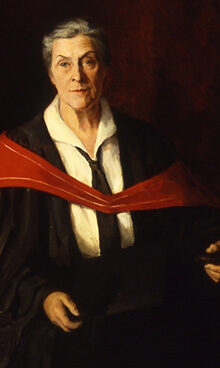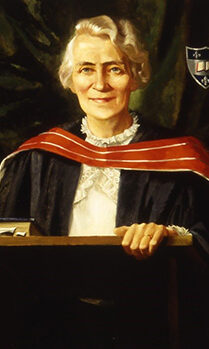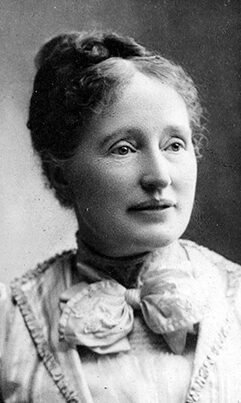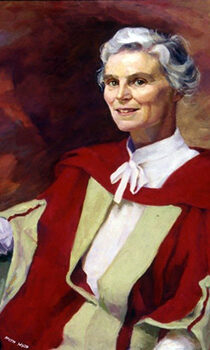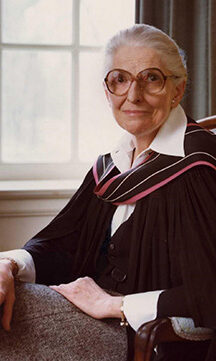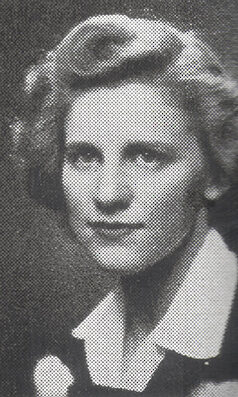Trinity Celebrates International Women’s Day 2020
To celebrate International Women’s Day, we’ve brought together the stories of some of our incredible students and alumnae. From Canada’s first female lawyer and the first female to hold a doctorate in computer science, to the women leaders of St. Hilda’s College, these trailblazing alumnae are an inspiring reminder of what has been accomplished, and what is left still to do.
Beatrice Worsley – Canada’s First Female Computer Scientist
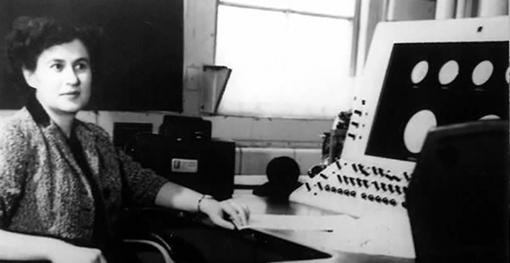
Beatrice Worsley, known to her friends and colleagues as Trixie, is believed to be both the first woman in the world to earn a doctorate in computer science and Canada’s first female computer scientist. She completed her undergraduate studies in mathematics and physics at U of T’s Trinity College in 1944, and soon afterwards enlisted in the Women’s Royal Canadian Naval Service.
For her doctoral studies in mathematical physics at Cambridge, she was supervised by computer science forerunners Maurice Wilkes and Alan Turing. Her dissertation, “Serial programming for real and idealized digital calculating machines” is considered the first on modern computing. This former assistant professor at U of T died at the age of 50 from a heart attack.
Read more about this trailblazer: Honouring Canada’s first female computer scientist: U of T’s Trixie Worsley and female U of T legends.
Learn about the scholarship Graduate Scholarship in Computer Science established in honour of Beatrice Worsley (1921–1972).
Clara Martin – Canada’s First Woman Lawyer
When Clara Martin was a law student living in a Toronto boarding house, a young male resident denounced her as a “very odd sort of woman.” His observation seemed to rest on her penchant for riding a bicycle – eyebrow-raising behaviour for a well-bred lady in the late 1800s. This wasn’t her first, or last, act of social impropriety, however. Martin – who graduated with a math degree in 1890 and a bachelor of civil law degree in 1897 from Trinity College, and an LLB in 1899 from U of T – succeeded in becoming the first woman lawyer in the British Empire. Her road was often a difficult, lonely one. “I was looked upon as an interloper, if not a curiosity,” said Martin of her articling days at a Toronto law firm. “The clerks avoided me and made it as unpleasant for me as they possibly could.”
Martin was also the first female student at Osgoode Hall Law School. In 1891, the Law Society of Upper Canada had informed her that admission to Osgoode was restricted to “persons” – and under the British North America Act, women did not qualify as such. With the help of Oliver Mowat, premier and attorney-general of Ontario, Martin galvanized the legislature into passing an 1892 act granting women access to the law school. She entered Osgoode the following year and was called to the Bar of Ontario in February 1897.
After working as a law clerk at two Toronto firms, Martin opened her own private practice. In 1923, at the age of 49, she died of a heart attack. Recalling her difficult path, and the stoicism of her early student years, Martin once said, “Were it not that I set out to open the way to the bar for others of my sex, I would have given up the effort long ago.” Read more about other incredible ‘firsts’ for women at the university in U of T Magazine.
Myrtle Burgess – The Woman In Provost Macklem’s Letter
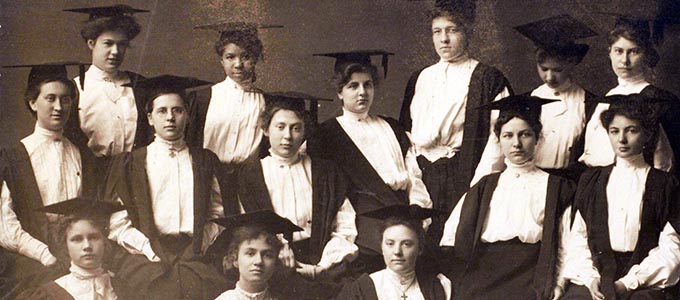
Myrtle Burgess was a Black student who studied at Trinity from 1905 to 1909. What little we know of Myrtle Burgess’ time at Trinity College is contained in a single letter. Written on November 21, 1905, the letter is from Provost Thomas Macklem and is a response to a complaint he received from a disgruntled female student at Trinity’s St. Hilda’s College.
Although we do not have both sides of the correspondence, what can easily be inferred from Provost Macklem’s response is that this student was not happy Myrtle Burgess was attending Trinity College. The reason was the colour of Myrtle’s skin. It is a credit to her intelligence, drive and tenacity that even in the face of discrimination, she continued her studies. Read more about Myrtle’s life and an excerpt from Provost Macklem’s letter.
Audrey Tobias – From Quiet Protester to Front Page News
Audrey Tobias was an activist who made headlines when she was criminally charged for refusing to fill out the census. An inspiring example of a woman who stood up for that she believed in, her story was featured in the Toronto Star.
Gloria Carpenter – Pioneer Who Helped Bring Legal Change to the Caribbean
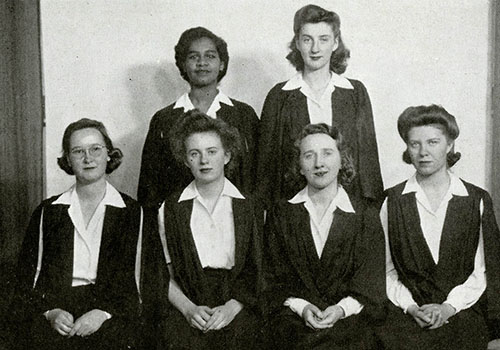
Trinity alumnae Gloria Clare Carpenter went on to become the first Black woman to graduate from Cambridge. In the photo below, she stands in the back row, on the left, in the 1943 edition of Torontonensis (photo courtesy of University of Toronto Archives).
Carpenter, who died in 1995, completed her Bachelor of Arts in law at U of T and, at the end of the Second World War, left Toronto to become the first Black woman to graduate from the University of Cambridge, where she pursued advanced legal studies. Read more about her story and how she paved the way for future generations.
Celebrating Leaders of St. Hilda’s College
Who are the people behind the named rooms at St. Hilda’s College? They are inspiring and compassionate women, accomplished scholars and influential leaders. Admired and revered by the Trinity community and beyond, their many contributions have helped to shape who we are as a community today: Elizabeth Abbott, Mabel Cartwright, Mossie May (Waddington) Kirkwood, Ellen (Patteson) Rigby, The Rev. Elizabeth Maude (Hunter) Rowlinson, Melinda Hartnet Seaman, Mary Stedman.
Click here to look back at some of the incredible women of St. Hilda’s College who left a special mark within the historic spaces of the college.
St. Hilda’s College was created in 1888 as the women’s College of Trinity, putting the College in the forefront of the movement for higher education for women. St. Hilda’s College was incorporated under its own Act on February 11, 1890 to “provide higher education for women in Affiliation with Trinity University.”
The United Nations officially recognized International Women’s Day in 1977. The day has recognizes the many achievements of women and girls, celebrates advancements in gender parity and invokes global calls to action.
View U of T’s statement in recognition of International Women’s Day.
Categories: Alumni; Discover Trinity; University of Toronto News




